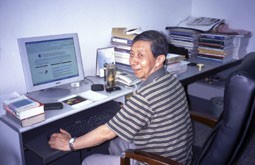Personal tools
News from ICTP 113 - Commentary

Long-time ICTP staff scientist, Yu Lu has found a new home in his old home: China.
Going Farther East
Three years ago, when Yu Lu retired
from ICTP, where he had served as long-time head of the Condensed
Matter Physics group, he was eager to return to China to work
with his native country's rapidly growing number of young researchers.
And that's exactly what he's been able to do as the first director
of the Interdisciplinary Center of Theoretical Studies (ICTS)
in Beijing. The Center was created in 2002 by the Chinese Academy
of Sciences (CAS), which has provided US$3 million in funding
to cover the Center's first four years of activity.
"ICTS's main aim," says Yu Lu, "is to promote research
in the emerging interdisciplinary areas that lie between physics
and other branches of science, including biology, chemistry, informatics,
material science and mathematics."
"It is not a conventional initiative," he adds. "We
don't have a faculty to speak of. Indeed we have very few people
with full-time contracts. Most of our 'research tutors' come from
Chinese or US universities and research institutes, spending only
part of their time with the Center. Post-doc fellows and long-term
visiting scientists come for two to five years. ICTS represents
an effort to explore new trends in science in a light but supportive
bureaucratic structure. The Center is hosted by the Institute
of Theoretical Physics (ITP), and hopefully we will move into
a new building by the end of next year."
The Center has formed five teams: (1) computational studies and
simulations of complex condensed matter systems; (2) strongly
correlated systems and low-dimensional condensed matter physics;
(3) physical and mathematical issues in superstring theory and
applications to cosmology; (4) interactions and modelling in living
systems; and (5) frontier topics in quantum information physics.

Yu Lu
Yu Lu explains: "Every research team operates in its own
way. For example, in strongly correlated systems, the meetings---dubbed
'journal clubs' and 'paper clinics'---are often held on weekends
and involve discussions of articles before they are submitted
to journals for formal review. Such discussions permit frank but
friendly criticism of each other's work, which not only promotes
collegiality but also improves the chances for getting the papers
published in internationally renowned journals."
Thanks largely to Yu Lu's assistance, ICTP is lending a helping
hand in the development of the new Center. For example, the two
institutions held a joint school on Electronic Structure Methods
and Applications in Beijing, China, in July 2004, which attracted
more than 250 participants. "The lecturers were quite surprised
both by the large number of young people and their enthusiasm,"
notes Yu Lu.
ICTP will continue its collaboration with ICTS next year when
three joint schools focussing on string theory, nanosciences and
statistical physics are scheduled to take place in Beijing. "We
hope to be able to continue to develop excellent programmes and
to draw outstanding lecturers and participants," says Yu
Lu. "At some point, I hope that ICTS can assume the status
of an Asian-Pacific branch of ICTP."
"The experience and inspiration I acquired during my 16-year
tenure in Trieste," Yu Lu says, "now guides what I am
doing in Beijing. So, in some measure, it's been nice to think
that I have taken some of ICTP with me to China."